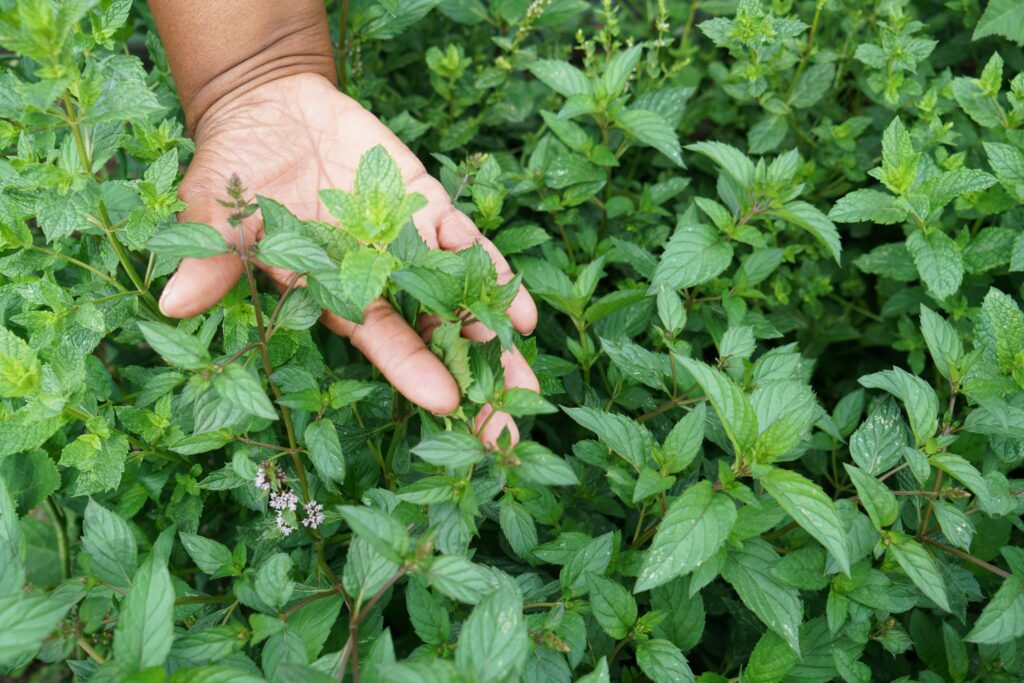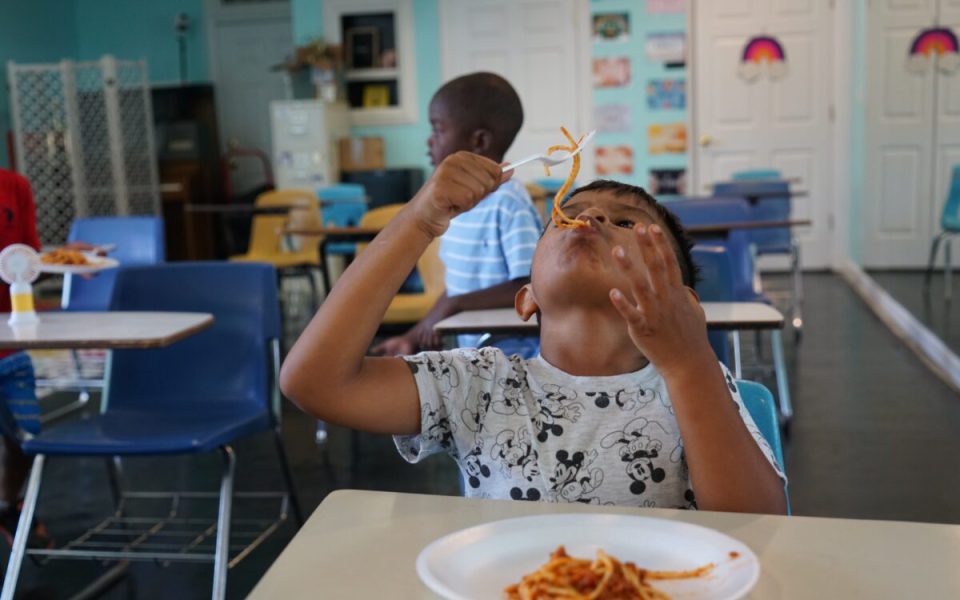Featured photo: An elementary school student eating lunch at D-Up’s summer camp program in High Point. (photo by Alli Lindenberg/Education NC)
This story was originally published by EducationNC, story by Alli Lindenberg
On a summer afternoon in July, campers at D-Up’s summer camp in High Point were learning how to use their freshly harvested potatoes in a recipe called “potatoes au gratin.” Just days before the cooking class, campers were elbows deep in soil, pulling out the potatoes that were planted months beforehand.
Over school break, students learned how to plant seeds, harvest vegetables, and cook French cuisine. At the Guilford County-based nonprofit, campers spent time doing academic, practical, and recreational activities every day.

D-Up staff member Natalie Lucas planned and led a cooking class for campers as one of their educational activities. She wanted to show the kids how plain potatoes can become a tasty dish through the addition of a few simple ingredients.
The campers were hesitant at first, most of them unfamiliar with the dish. After Lucas walked them through the first few steps – cutting the potatoes and grating the cheese – their apprehension turned quickly into excitement. Several students asked to come up and smell the seasoning and get a better look at the roux settling over the newly cut potatoes. One student even asked to smell the gruyere cheese.
From planting and harvesting to preparing and cooking, these campers are learning how to address food insecurity in their own communities while being fed themselves.

Homegrown leadership
Founded in 2007, D-Up is a nonprofit organization that aims to teach healthier eating and increase physical activity in children in Guilford County, according to their website. They offer after-school programs during the school year and a camp in June and July.
The Greensboro-High Point Metropolitan Statistical Area ranks as number 14 in the nation, according to the Greater High Point Food Alliance. D-Up is an example of how community organizations step in to help with child nutrition during the summer months when students aren’t in school.
The organization is beloved by its kids and their families. D-Up’s programs have remained at full capacity for over a decade without having to use more than word-of-mouth marketing. This summer, D-Up had 50 students participate in the program and had a waitlist of 20 kids. Most of the campers in D-Up are siblings of older kids in the program, which has created a sustainable process of recruitment for the organization.
Founders Jakki and Corvin Davis are local to the area. The couple met as students at North Carolina Agricultural & Technical State University years ago and have maintained a passion for healthy living and cultivating community ever since.
D-Up is a part of the Greater High Point Food Alliance (GHPFA), a nonprofit organization dedicated to improving the effectiveness of entities in the greater High Point area focused on alleviating hunger. Washington Street, where D-Up is located, is one of the alliance’s four partner neighborhoods across the city. D-Up has received grant funding from the GHPFA and remains in active partnership with the organization.

Food education for all
With food insecurity as a challenge for the city and greater community, D-Up prioritizes food education in the camp’s curriculum.
While there are food pantries in High Point, many kids and families often have additional needs. In addition, providing education about how to cook food is a gap in the community that the organization is trying to fill.
“If you don’t have money, then what are you going to buy? You’re not going to buy the fresh fruits and veggies. You’re going to use whatever was donated to you,” Davis said. “Unfortunately, although we do great with our pantries, we give what we receive (from them) and it’s not always the healthiest.”

Gardening and cooking are two of the food education activities offered at D-Up’s summer camp. They grow a variety of produce, including mint, blackberries, lettuce, and potatoes. The campers harvest the produce and either take them home or use them in an activity.
D-Up schedules its day of camp in sections. The students arrive around noon and have lunch first. Then they have an activity or two in the afternoon, with one always being related to academics and one that is more recreational on a rotating basis.
Food is woven into every day at camp, with a love of cooking coming from more than just chef Lucas. Co-founder Corvin Davis has an affinity for making and sharing meals. Often, he is the one who cooks lunch for the campers. According to Davis, spaghetti is a favorite, and usually holds kids over until they get a snack later in the day.

Luckily, the pasta lunch staved off some of the campers’ hunger during the potatoes au gratin assembly. However, it didn’t seem to dampen the students’ natural curiosity for the lesson. After the demonstration, interested campers were sent home with the recipe to try on their own with their families.
While the garden provided a dozen or so potatoes, they didn’t have enough to send each camper home with the vegetable. The staff is not discouraged though. With the community they have built over the years and the resources they have been able to offer, they know they are making a difference.
“We take what we can get, and we are grateful,” said Davis.
You can learn more about D-Up here.
This article first appeared on EducationNC and is republished here under a Creative Commons license.
Join the First Amendment Society, a membership that goes directly to funding TCB‘s newsroom.
We believe that reporting can save the world.
The TCB First Amendment Society recognizes the vital role of a free, unfettered press with a bundling of local experiences designed to build community, and unique engagements with our newsroom that will help you understand, and shape, local journalism’s critical role in uplifting the people in our cities.
All revenue goes directly into the newsroom as reporters’ salaries and freelance commissions.


Leave a Reply